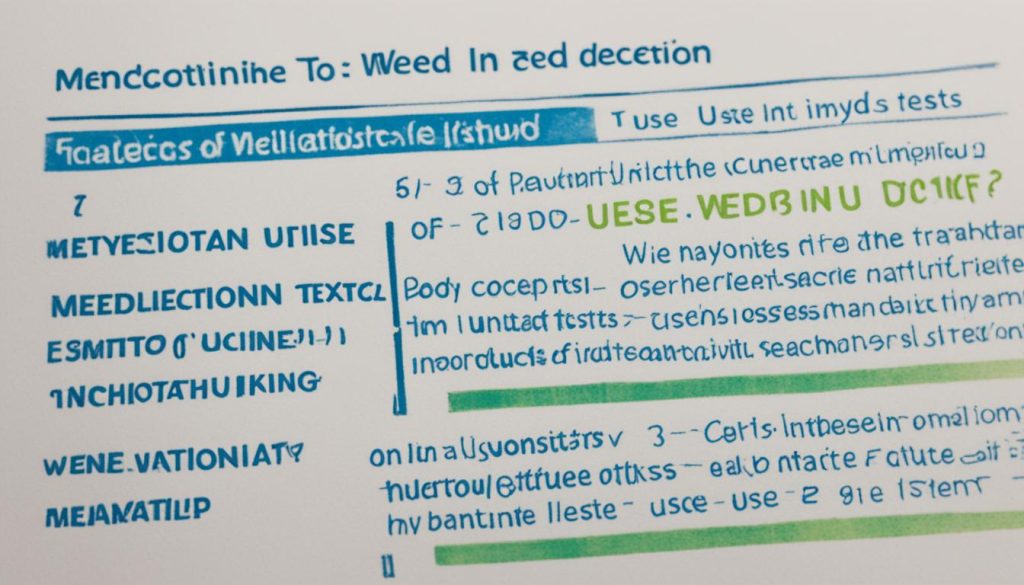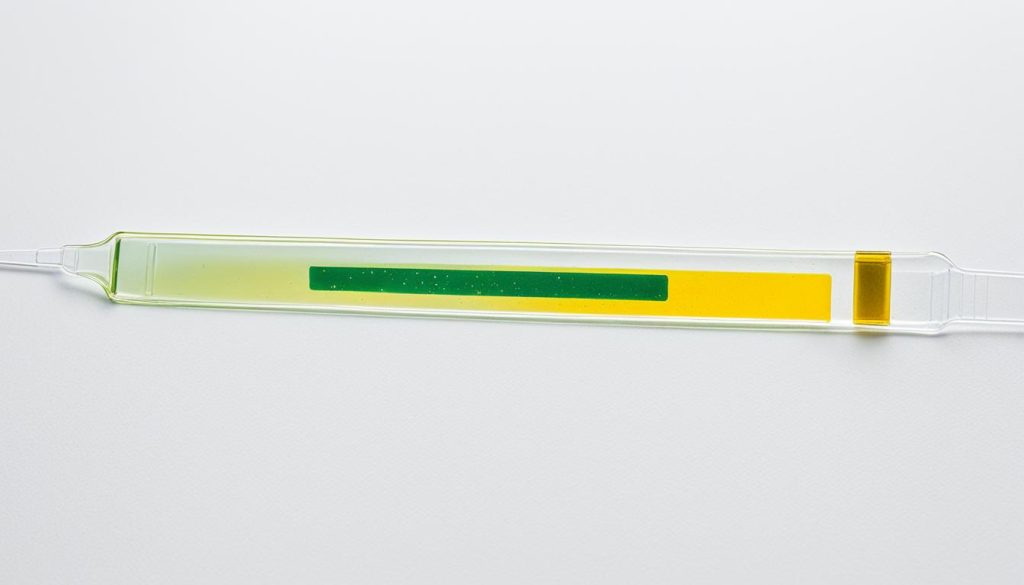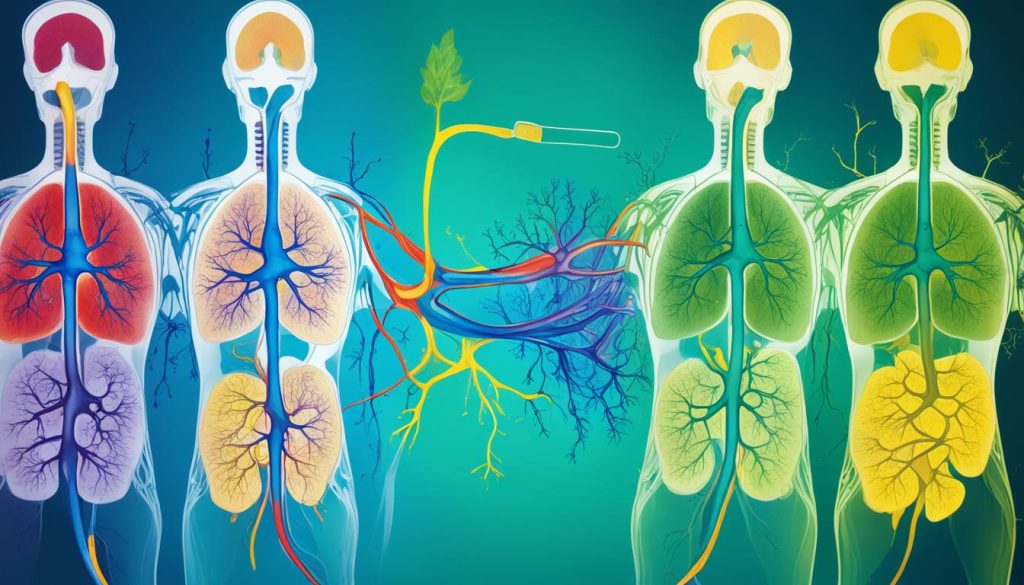How Long Does Weed Stay in Your System Urine Test?
Tetrahydrocannabinol (THC), the psychoactive compound in marijuana, can be detected in urine tests for various durations depending on individual factors. If you’re wondering how long does weed stay in your system urine test, it’s important to consider factors such as body fat percentage, smoking frequency, and the sensitivity of the drug test.
THC is fat-soluble, meaning it binds to fat cells in the body, prolonging its elimination. On average, a urine test can detect cannabis in the urine for 1-30 days after use, with heavy and chronic users potentially having a longer detection window. The precise detection time varies based on an individual’s habits and characteristics.
To learn more about marijuana detection time in urine and factors that can affect detection, continue reading.
Factors Affecting Detection Time
In order to accurately determine the presence of marijuana in a urine test, it is important to consider various factors that can influence the detection time. These factors include:
1. Body Fat Percentage
THC is stored in fat cells and takes longer to metabolize in individuals with higher body fat percentage. Therefore, individuals with higher body fat may have a longer detection window for marijuana in their urine.
2. Sensitivity of Drug Test
The sensitivity of the drug test is crucial in detecting lower doses of THC. More sensitive tests have a higher chance of detecting even trace amounts of marijuana in the urine.
3. Frequency of Marijuana Consumption
The frequency of marijuana consumption plays a major role in detection time. Chronic use of marijuana can result in THC accumulating in fatty tissues, leading to a slower elimination of metabolites and a longer detection window in urine tests.
4. Quantity of Marijuana Consumed
The quantity of marijuana consumed also affects the detection time. Higher doses of marijuana can result in larger amounts of THC being stored in the body, leading to a longer detection window in urine tests.
5. Hydration
Hydration levels can impact the rate at which THC is metabolized and eliminated from the body. Staying well-hydrated can potentially help flush out THC metabolites more quickly.
6. Exercise
Regular exercise can also play a role in THC metabolism. Physical activity can help break down fat cells, releasing THC into the bloodstream for elimination. However, intense exercise close to the time of a urine test may temporarily increase THC levels in the urine and could result in a positive test.
7. Metabolism Rate
Metabolism rate varies among individuals and can impact the rate at which THC is metabolized and eliminated from the body. Individuals with higher metabolism rates may process and eliminate THC more quickly.
8. Sex
Sex can also be a factor in THC metabolism. Some studies suggest that females may eliminate THC at a slightly slower rate compared to males.

In summary, several factors can influence the detection time of marijuana in a urine test. These include body fat percentage, sensitivity of the drug test, frequency and quantity of marijuana consumption, hydration levels, exercise, metabolism rate, and sex. Understanding these factors is crucial in interpreting the results of a urine test accurately.
Detection Windows in Different Tests
When it comes to detecting marijuana in drug tests, the detection windows can vary depending on the type of test conducted. Let’s explore the different tests and their respective detection periods:
1. Urine Test
The most common type of drug test is the urine test. It can detect cannabis in urine for approximately 1-30 days after use. However, it’s essential to note that the detection window can vary based on factors such as the frequency and quantity of marijuana consumption.
2. Saliva Test
Saliva tests have a shorter detection window compared to urine tests. Typically, they can detect THC for up to 24 hours. However, some evidence suggests that saliva tests may be able to detect THC from oral dosing for up to 44 hours.
3. Hair Test
Hair tests are the most sensitive type of drug test when it comes to detecting marijuana. They can detect THC for up to 90 days after use. This extended detection period is because THC and its metabolites can become incorporated into the hair shaft.
4. Blood Test
Blood tests have a very short detection window for THC. They can only detect THC for a few hours after use. However, it’s important to note that blood tests are less commonly used for marijuana detection compared to urine or hair tests.
5. Sweat Test
Sweat tests are relatively uncommon but can detect cannabis in sweat for 7-14 days after use. These tests are not widely used due to their limited availability and the potential for contamination of the sweat sample during collection.
| Test Type | Detection Window |
|---|---|
| Urine Test | Approximately 1-30 days |
| Saliva Test | Up to 24 hours, potentially up to 44 hours for oral dosing |
| Hair Test | Up to 90 days |
| Blood Test | A few hours |
| Sweat Test | 7-14 days |
It’s important to note that the detection windows mentioned above are general estimates and can vary depending on individual factors. Additionally, the sensitivity and accuracy of the drug test used can also influence the detection period. If you have concerns about the specific detection window for a particular test, it’s always best to consult with a healthcare professional or testing facility.

THC Metabolism and Elimination
When marijuana is smoked or ingested, THC is absorbed into the bloodstream. In the liver, it undergoes metabolism and is converted into various metabolites, including 11-OH-THC and THCCOOH. These metabolites are then eliminated from the body through urine and stool. The rate at which THC and its metabolites are eliminated can vary depending on individual factors.
The metabolism rate, excretion routes, and overall health of an individual play a role in determining how long it takes for THC to be fully eliminated from the body. The breakdown and elimination of THC and its metabolites are complex processes influenced by factors such as liver function, kidney function, and overall metabolic rate.
To provide visual representation, here is an informative table summarizing the THC metabolism and elimination process:
| Process | Description |
|---|---|
| 1. Absorption | THC is absorbed into the bloodstream when marijuana is smoked or ingested. |
| 2. Metabolism | In the liver, THC is metabolized into various compounds, including 11-OH-THC and THCCOOH. |
| 3. Elimination | Metabolites are excreted from the body through urine and stool. |
Understanding the THC metabolism and elimination process is essential for comprehending how long THC and its metabolites can be detected in drug tests. It is important to note that the rate of elimination is influenced by various factors and can differ between individuals.

Detoxification and Ways to Speed up THC Elimination
While there is no foolproof method to speed up the elimination of THC from the body, certain strategies may help promote faster elimination. Here are some tips on THC detoxification:
1. Exercise and THC Metabolism
Regular exercise can play a role in speeding up THC elimination. When you exercise, fat cells are broken down, releasing THC into the bloodstream. This can help the body eliminate THC more efficiently. However, it’s important to exercise in moderation to avoid a positive result on a drug test. Aim for a balanced exercise routine to support overall health and metabolism.
2. Diet and THC Elimination
Following a healthy diet can aid in the elimination of THC metabolites. Consuming fiber-rich foods can promote bowel movements, which can assist in flushing out THC from the body. Include fruits, vegetables, whole grains, and legumes in your diet to support digestion and detoxification. Additionally, focusing on a diet rich in antioxidants can help support overall liver health, which is essential for metabolizing THC.
3. Drinking Water and THC Elimination
Staying hydrated by drinking water can help flush out THC metabolites through urine and bowel movements. Water is essential for optimal kidney function, which plays a critical role in filtering waste products, including THC metabolites, from the bloodstream. Aim to drink an adequate amount of water throughout the day to support the body’s natural detoxification processes.
4. Sleep and THC Metabolism
Getting enough quality sleep is essential for overall health and can also support optimal metabolism. During sleep, the body undergoes important restorative processes, including toxin elimination. Prioritize a consistent sleep schedule and create a relaxing bedtime routine to ensure adequate rest. By supporting the body’s natural processes, sufficient sleep can aid in the metabolism and elimination of THC metabolites.
Remember, time is the most crucial factor in THC clearance. While these strategies may help promote faster elimination, it’s important to allow your body enough time to naturally detoxify. It’s also worth noting that these tips are not foolproof methods to guarantee passing a drug test. The best course of action is to abstain from marijuana use for a significant period before a drug test to ensure the best chances of a negative result.

| Strategy | Effectiveness |
|---|---|
| Exercise | Moderate |
| Diet and fiber consumption | Helpful |
| Drinking water | Beneficial |
| Sleep and rest | Supportive |
Conclusion
The duration that marijuana can be detected in a urine test varies based on several factors, including individual characteristics, frequency of use, and the type of drug test used. THC metabolites can remain in the body for 1-30 days after use for most individuals, with heavy and chronic users potentially having longer detection windows.
It is important to note that drug tests are not indicators of impairment, but rather measure the presence of THC in the system. While certain strategies may help promote faster elimination of THC, there is no guaranteed method to speed up the process. The most reliable way to pass a drug test is to abstain from marijuana use for a significant period before the test.
FAQ
1. How long does weed stay in your system for a urine test?
The duration that marijuana can be detected in a urine test varies based on several factors, including individual characteristics, frequency of use, and the sensitivity of the drug test. On average, cannabis can be detected in the urine for 1-30 days after use.
2. What factors affect the detection time of marijuana in a urine test?
Factors that can influence the detection time of marijuana in a urine test include body fat percentage, sensitivity of the drug test, frequency of marijuana consumption, and the quantity consumed. Higher body fat percentage and chronic use can result in longer detection windows.
3. What are the detection windows for marijuana in different drug tests?
The detection windows for marijuana in different drug tests vary. Urine tests, the most common type, can detect cannabis in the urine for approximately 1-30 days. Saliva tests have a shorter detection window, usually up to 24 hours, while hair tests can detect THC for up to 90 days. Blood tests have a very short detection period of just a few hours.
4. How is THC metabolized and eliminated from the body?
THC is metabolized in the liver into various metabolites, such as 11-OH-THC and THCCOOH. These metabolites are then excreted from the body through urine and stool.




